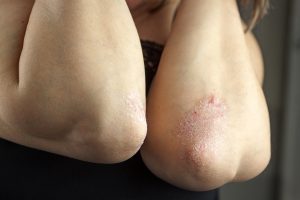 Psoriasis and psoriatic arthritis patients receiving biologics therapy show reduction in depression and insomnia. The National Psoriasis Foundation states that individuals affected by psoriasis or psoriatic arthritis are at a higher risk of depression, compared to the general public. Symptoms of depression include insomnia and anxiety, which causes patients to use high amounts of antidepressants.
Psoriasis and psoriatic arthritis patients receiving biologics therapy show reduction in depression and insomnia. The National Psoriasis Foundation states that individuals affected by psoriasis or psoriatic arthritis are at a higher risk of depression, compared to the general public. Symptoms of depression include insomnia and anxiety, which causes patients to use high amounts of antidepressants.
The researchers identified 980 patients with psoriasis or psoriatic arthritis receiving biologics therapy. The researchers compared rates of patients taking medications for depression and insomnia before and after biologics therapy.
Advertisement
Prior to biologics treatment, 20 percent of patients were taking antidepressants. After two years of biologics, there was over a 40 percent reduction in antidepressant use.
The researchers also found that being over the age of 45, being a woman, having comorbidities, and suffering from psoriatic arthritis are independent risk factors for depression and insomnia. Biologics therapy in those younger than 45 actually sped up the reduction of the antidepressant use.
The authors concluded, “The results suggest that biologics therapy may be associated with reduced rates of depression and insomnia, and a reduced rate of regular antidepressant use in psoriasis patients.”
Psoriasis, psoriatic arthritis, and depression
Psoriasis patients use antidepressants at a much higher rate, compared to individuals without psoriasis. The use of antidepressants and consulting with a mental health specialist can improve the quality of living with psoriasis.
Managing psoriasis is a great way of improving the quality of life, and those who do properly manage their condition miss less days at work and become more productive employees as well.
Advertisement
Research has shown that the use of biologics can also help improve mental health, but it is unclear whether this is a result of the medications or improved psoriasis, resulting in lower depression levels.
There are many reasons why living with psoriasis would lead to depression. The skin condition can cause pain, stiffness, and fatigue, just to name a few. These factors can limit a person’s ability to partake in events they once loved, which can make them feel lonely and isolated.
The good news is, depression is treatable as long as you open up about your condition to someone – whether that is a loved one or a healthcare professional. If you continue to keep your depression in secret, it can get worse, which can negatively impact your overall quality of life. It is important that you speak about your depression with someone to seek help. Not only will it improve your mental health, but your psoriasis as well.
